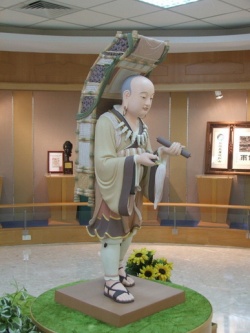Difference between revisions of "Dharma character school"
| Line 1: | Line 1: | ||
[[File:Xuanzang478.jpg|thumb|250px|]] | [[File:Xuanzang478.jpg|thumb|250px|]] | ||
| − | '''[[Dharma-character school]]''' is the pejorative [[name]] for [[a stream]] of [[thought]] that represented the [[Indian]] [[Yogācāra]] system of [[thought]] in {{Wiki|East Asia}}. One of the founders of the [[Hosso]] sect was [[Tz'u-en]]. | + | '''[[Dharma-character school]]''' is the pejorative [[name]] for [[a stream]] of [[thought]] that represented the [[Indian]] [[Yogācāra]] system of [[thought]] in {{Wiki|East Asia}}. One of the founders of the [[Hosso]] [[sect]] was [[Tz'u-en]]. |
Its proponents preferred the title [[Consciousness-only school]] . The {{Wiki|movement}} that would eventually receive these names was initiated in [[China]] by [[Xuanzang]] , who, on his return from [[India]], brought with him a wagonload of the most important [[Consciousness-only]] texts. | Its proponents preferred the title [[Consciousness-only school]] . The {{Wiki|movement}} that would eventually receive these names was initiated in [[China]] by [[Xuanzang]] , who, on his return from [[India]], brought with him a wagonload of the most important [[Consciousness-only]] texts. | ||
| Line 6: | Line 6: | ||
These, with government support and many assistants, he translated into . His [[disciple]] {{Wiki|Kuiji}} wrote a number of important commentaries on the [[Yogacara]] texts and further developed the [[influence]] of this [[doctrine]] in [[China]]. {{Wiki|Kuiji}} is considered the first [[patriarch]] of this school. | These, with government support and many assistants, he translated into . His [[disciple]] {{Wiki|Kuiji}} wrote a number of important commentaries on the [[Yogacara]] texts and further developed the [[influence]] of this [[doctrine]] in [[China]]. {{Wiki|Kuiji}} is considered the first [[patriarch]] of this school. | ||
| − | The Faxiang teachings were transmitted to [[Korea]] and [[Japan]] , where they made considerable impact. Although a relatively small [[Hosso]] sect [[exists]] in [[Japan]] to this day, the original [[tradition]] has all but [[died]] out as an independent sect. However, its [[Consciousness-only]] teachings made a major impact on the native {{Wiki|East Asian}} [[traditions]] that would later develop, most notably [[Tiantai]], [[Huayan]] and [[Buddhism]]. | + | The [[Faxiang]] teachings were transmitted to [[Korea]] and [[Japan]] , where they made considerable impact. Although a relatively small [[Hosso]] [[sect]] [[exists]] in [[Japan]] to this day, the original [[tradition]] has all but [[died]] out as an {{Wiki|independent}} [[sect]]. However, its [[Consciousness-only]] teachings made a major impact on the native {{Wiki|East Asian}} [[traditions]] that would later develop, most notably [[Tiantai]], [[Huayan]] and [[Buddhism]]. |
| − | The term ''Faxiang'' itself was first applied to this [[tradition]] by the [[Huayan]] thinker [[Fazang]] , who used it to emphasize the inferiority of Faxiang teachings, which only dealt with the [[phenomenal]] [[appearances]] of the [[dharmas]] in contrast to [[Huayan]], which dealt with the underlying nature on which such [[phenomenal]] [[appearances]] were based. | + | The term ''[[Faxiang]]'' itself was first applied to this [[tradition]] by the [[Huayan]] thinker [[Fazang]] , who used it to {{Wiki|emphasize}} the {{Wiki|inferiority}} of [[Faxiang]] teachings, which only dealt with the [[phenomenal]] [[appearances]] of the [[dharmas]] in contrast to [[Huayan]], which dealt with the underlying [[nature]] on which such [[phenomenal]] [[appearances]] were based. |
{{R}} | {{R}} | ||
[http://credit-report-score-deep.blogspot.com.au/2008/09/dharma-character-school.html credit-report-score-deep.blogspot.com.au] | [http://credit-report-score-deep.blogspot.com.au/2008/09/dharma-character-school.html credit-report-score-deep.blogspot.com.au] | ||
[[Category:East Asian Yogācāra]] | [[Category:East Asian Yogācāra]] | ||
Revision as of 06:02, 17 January 2015
Dharma-character school is the pejorative name for a stream of thought that represented the Indian Yogācāra system of thought in East Asia. One of the founders of the Hosso sect was Tz'u-en.
Its proponents preferred the title Consciousness-only school . The movement that would eventually receive these names was initiated in China by Xuanzang , who, on his return from India, brought with him a wagonload of the most important Consciousness-only texts.
These, with government support and many assistants, he translated into . His disciple Kuiji wrote a number of important commentaries on the Yogacara texts and further developed the influence of this doctrine in China. Kuiji is considered the first patriarch of this school.
The Faxiang teachings were transmitted to Korea and Japan , where they made considerable impact. Although a relatively small Hosso sect exists in Japan to this day, the original tradition has all but died out as an independent sect. However, its Consciousness-only teachings made a major impact on the native East Asian traditions that would later develop, most notably Tiantai, Huayan and Buddhism.
The term Faxiang itself was first applied to this tradition by the Huayan thinker Fazang , who used it to emphasize the inferiority of Faxiang teachings, which only dealt with the phenomenal appearances of the dharmas in contrast to Huayan, which dealt with the underlying nature on which such phenomenal appearances were based.
